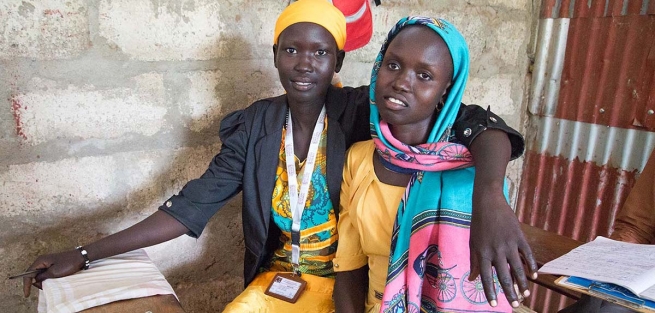
WORLD DAY AGAINST TRAFFICKING IN PERSONS: Salesian Missions highlights programs that educate youth and help them find employment to decrease risk of trafficking
Programs in India, Mali and Senegal illustrate the work of Salesians around the globe that support efforts to prevent youth from falling victim to human trafficking.
NEW ROCHELLE, NY (July 30, 2020) Salesian Missions, the U.S. development arm of the Salesians of Don Bosco, joins humanitarian organizations and countries around the globe in recognizing World Day Against Trafficking in Persons. In 2013, United Nations member states adopted a resolution that designated July 30 as the World Day Against Trafficking in Persons. The day aims to raise awareness about the victims of human trafficking and promote and protect their rights.
This year’s theme focuses on first responders to human trafficking, highlighting and honoring those “identifying, supporting, counseling and seeking justice for victims of trafficking, and challenging the impunity of the traffickers.”
Since 2003, the United Nations Office on Drugs and Crime (UNODC) has collected information on nearly 225,000 victims of trafficking detected worldwide and released the 2018 UNODC Global Report on Trafficking in Persons. It states, “The vast majority of detected victims of trafficking for sexual exploitation and 35 percent of those trafficked for forced labor are female.”
Data also shows that trafficking happens all around the globe, affecting every country. The share of people trafficked within their own country has doubled in recent years to 58 percent of all detected victims.
“Salesian missionaries around the globe provide programs and services to help youth lead healthier productive lives and ensure their safety,” says Father Gus Baek, director of Salesian Missions. “Part of the focus of Salesian missionaries in many countries is educating youth about the dangers associated with migration and those who might wish them harm. One of the primary ways we support youth is understanding the needs of the local market and providing training programs that help youth find work in their own communities in employment sectors that are looking for skilled labor.”
To mark World Day Against Trafficking in Persons 2020, Salesian Missions is proud to highlight programs around the globe that provide life-changing education, and prevention and awareness programs.
INDIA
The Salesian College Sonada has entered into a new partnership with Rimpocha Tea, based in Siliguri, India, to provide vocational training for adolescent girls in the area who are at risk of exploitation and human trafficking.
The Salesian College was founded in 1938 and is located in the village of Gorabari. More than 95 percent of its student population comes from the hills of Darjeeling, a region known throughout the world for the quality of its tea leaves. In the Darjeeling District, there are currently 83 tea farms covering an area of about 19,000 hectares. These tea farms provide stable employment for more than 52,000 people.
The area faces challenges with people migrating from rural regions in search of a better life in more populous areas, which also puts people, especially girls, at risk of human trafficking. Compounding the problem are the low wages provided to those working in the tea industry. Many leave in search of better paying jobs.
Local organizations working to prevent trafficking estimate that more than 400 girls are trafficked every year from tea gardens, mostly from those gardens that have stopped functioning. Traffickers first look for their victims where hunger and poverty are higher, rather than areas were businesses are stable and there are more opportunities for higher education and healthcare facilities.
MALI
Salesian missionaries in Mali have launched a “Stop Trafficking” campaign that has had much success since its October 2015 launch in Ethiopia, Ghana and Senegal. A collaborative effort between the Salesian-run International Voluntary Service for Development (VIS) and the Don Bosco Mission Association in Turin, Italy, the campaign is now being launched in Mali, Nigeria and Liberia.
The campaign raises awareness of the dangers of youth migration. With a focus on youth leaving countries in Africa in search of a better life in Europe, it aims to prevent young migrants from becoming victims of crime and exploitation.
The Salesian Vocational Training Center in Bamako, Mali’s capital city, currently offers four diploma-based courses in metalworking, electricity and solar energy, automotive and agricultural mechanics, and entrepreneurship. The center also awards a secondary school diploma in automotive mechanics and metalworking.
A goal of the campaign is to be able to offer these courses to additional youth in need. Salesian missionaries aim to increase the center’s enrollment from 433 students to 809 in the 2020 school year. They also plan to roll out a system to better identify vulnerable youth and make inroads in helping them secure employment after graduation. In addition, the campaign will launch agricultural training in the rural town of Moribabougou that mostly targets women.
SENEGAL
The “Stop Trafficking” campaign has launched additional activities to promote development and reduce migration in East and West Africa. For 15 months, project activities will focus on youth in Senegal, Gambia and Guinea Bissau.
First, the project will provide access to education through scholarships and work grants so that youth will be prepared for employment to meet current labor market needs. The project will also provide kits that will allow participants to start micro-enterprises in strategic sectors.
The project will work to strengthen the existing formal and informal psycho-social care that young migrants receive when they return back to their home countries to help them reintegrate into their communities. Lastly, the project will raise awareness among youth about the risks of migration. It will provide them with the resources to connect to education and employment in their own countries to reduce the need for migration. This will be done through a series of radio campaigns and cultural events such as theatrical performances, film screenings and debates locally as well as in Italy.
### Contact: [email protected]
